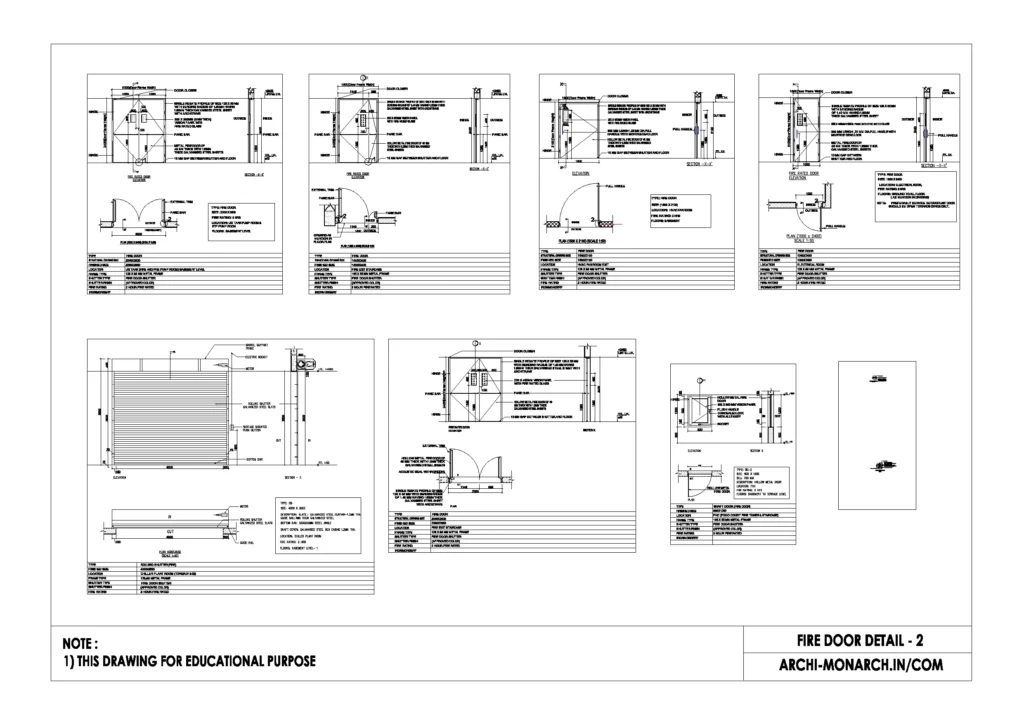A fire door is a specialized door designed to prevent or delay the spread of fire and smoke within a building. It is an essential component of passive fire protection systems in architecture. Fire doors are typically made of fire-resistant materials, such as steel or solid timber, and are equipped with fire-rated hardware, including hinges, locks, and seals.
The primary purpose of a fire door is to compartmentalize a building into fire-resistant compartments, limiting the fire’s spread from one area to another. By doing so, fire doors provide occupants with a safe means of evacuation and allow firefighters to control the fire’s progression.
Fire doors are subjected to stringent testing and certification procedures to ensure their effectiveness. They are rated based on their ability to withstand fire for a specified period, such as 30 minutes, 60 minutes, or 90 minutes. The rating indicates the door’s fire resistance and the duration it can withstand the heat and flames.
Fire doors must be properly installed, maintained, and kept clear of obstructions to ensure their functionality. They should remain closed and self-close automatically to prevent the spread of fire and smoke. Fire door assemblies also include intumescent seals that expand when exposed to heat, forming a barrier against smoke and flames.
In addition to their fire-resistant properties, fire doors may also have other features like sound insulation, thermal insulation, and security enhancements. These additional attributes contribute to overall building safety and occupant comfort.
Fire doors play a crucial role in safeguarding buildings and the people within them during a fire emergency. Architects, building owners, and professionals involved in construction must adhere to building codes and regulations that govern the installation and maintenance of fire doors to ensure the highest level of fire safety.
If you want to know about the working drawing or water tank detail or landscape detail, please click the link.
Image of fire door detail and downloadable (in DWG) link below

Fire doors detail drawing – 2
Fire doors design may vary depending on specific building codes, regulations, and manufacturer specifications. It’s always recommended to consult the relevant standards and guidelines for accurate details. Here is a general description of a fire door detail:
1) Door Frame:
- The door frame is usually made of steel or fire-resistant timber.
- It should have a fire resistance rating compatible with the fire door.
- The frame typically consists of jambs (vertical sides) and a head (horizontal top).
2) Door Leaf:
- The door leaf is the actual door panel that fits within the frame.
- It is constructed using fire-resistant materials such as solid timber or steel.
- The thickness of the door leaf depends on the required fire rating.
3) Fire-Rated Hardware:
- Fire doors require specific hardware components designed to maintain fire resistance.
- Hinges: Fire-rated hinges that are capable of withstanding the weight of the door.
- Locks and Latches: Fire-rated locks and latches that allow secure closure of the door.
- Door Closer: A self-closing mechanism that ensures the door closes automatically after use.
- Panic Hardware: In some cases, fire doors may require panic hardware for emergency exits.
4) Intumescent Seals:
- Intumescent seals are installed around the edges of the door leaf.
- These seals are made of materials that expand when exposed to heat, creating a barrier against smoke and flames.
5) Vision Panels:
- Fire doors may incorporate vision panels to provide visibility between spaces.
- These panels are typically made of fire-resistant glass or other approved materials.
- The size and location of vision panels should comply with fire safety regulations.
It’s important to note that specific fire door details may differ depending on factors such as fire rating requirements, local building codes, and manufacturer specifications. For accurate and detailed drawings, it’s recommended to consult architectural drawings, fire door manufacturers, or professionals experienced in fire door installation and design.
Our tips to help you improve your architectural Fire door detailing.
